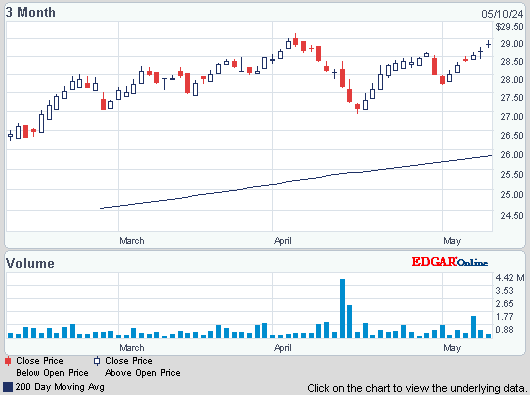Dow dropped 64, decliners over advancers 4-1 & NAZ was off 9. The MLP index fell 5 to 449 (a very big drop) & the REIT index lost 1+ to the 298s. Junk bond funds edged lower & Treasuries rose, with yields near their lowest levels this year. Oil sank below 90, a key support level, & gold slumped below 1400 to a 2-year low after dropping into a bear market last week as optimism that a US recovery will curb the need for
stimulus cut demand for a protection of wealth.
AMJ (Alerian MLP Index tracking fund)


Photo: Bloomberg
China's economic growth unexpectedly lost momentum in Q1 as gains in factory output & consumption weakened, driving stocks lower on concern global expansion will slow. GDP rose 7.7% from a year earlier, the National Bureau of Statistics reported, below the 8% forecast & below 7.9% last year. Mar industrial production increased less than estimated while retail-sales growth only matched forecasts. Growth forecasts were cut to 7.8% at 2 major banks. The statistics bureau characterized the economy in Q1 as “stable,” saying the expansion rate isn’t low compared with other nations. China’s new leadership is putting more emphasis on quality of growth, & urbanization will continue to create demand. While the economy has had a smooth start to the year, China still faces a complex situation due to instability & uncertainty domestically & abroad, Premier Li said.
AMJ (Alerian MLP Index tracking fund)
Treasury yields:
U.S. 3-month |
0.053% | |
U.S. 2-year |
0.224% | |
U.S. 10-year |
1.720% |
| CLK13.NYM | ...Crude Oil May 13 | ...89.42 | (2.1%) |
| GCJ13.CMX | ....Gold Apr 13 | ......1,397.50 | (6.9%) |

Photo: Bloomberg
China's economic growth unexpectedly lost momentum in Q1 as gains in factory output & consumption weakened, driving stocks lower on concern global expansion will slow. GDP rose 7.7% from a year earlier, the National Bureau of Statistics reported, below the 8% forecast & below 7.9% last year. Mar industrial production increased less than estimated while retail-sales growth only matched forecasts. Growth forecasts were cut to 7.8% at 2 major banks. The statistics bureau characterized the economy in Q1 as “stable,” saying the expansion rate isn’t low compared with other nations. China’s new leadership is putting more emphasis on quality of growth, & urbanization will continue to create demand. While the economy has had a smooth start to the year, China still faces a complex situation due to instability & uncertainty domestically & abroad, Premier Li said.

Photo: Bloomberg
Business is also cooling in the US. Confidence among US homebuilders unexpectedly fell in Apr for a 3rd month, restrained by rising costs for materials & financing restrictions. The National Association of Home Builders/Wells Fargo index of builder confidence dropped to 42, the lowest since Oct, from 44 in Mar. The projection was for a reading of 45 (below 50 mean more respondents said conditions were poor). “Many builders are expressing frustration over being unable to respond to the rising demand for new homes due to difficulties in obtaining construction credit, overly restrictive mortgage lending rules and construction costs that are increasing at a faster pace than appraised values,” Rick Judson, the group’s chairman & a builder said. The report showed builders grew more concerned about current sales & buyer traffic, indicating demand has cooled along with the rest of the economy. Nonetheless, residential construction firms were the most optimistic about future sales than at any time in 6 years, a sign the industry will keep contributing to the expansion.
Homebuilder Confidence in U.S. Unexpectedly Dropped in April

Photo: Bloomberg
Intl demand for US stocks, bonds & other financial assets plunged in Feb as investors in Japan, the UK & Switzerland reduced holdings of Treasuries. Net selling of long-term equities, notes & bonds totaled $17.8B, down from net purchases of $25.7B in Jan, according to the Treasury Dept. The projection called for net buying of $40B of long-term assets. Investors sought shelter outside of the DC lawmakers wrestled with budget cuts & as the European economic confidence in the area rose more than economists forecast in Feb. Estimates ranged from net buying of $20-$65B. China remained the biggest foreign owner of Treasuries after its holdings rose $8.7B to $1.22T & Japan, the 2nd-largest holder, lowered its holdings by $6.8B to $1.097T. Foreigners sold a net $122M of Treasuries in Feb, compared with purchases of $32B the month before.
Foreign Demand for U.S. Financial Assets Plunged in February
Selling finally got the better of the buyers & stocks lost their way. The China economic news was very disappointing. It has a large economy which has helped support the global economy when Europe is in a recession & the US economy is stumbling. US GDP data for Q1 should be released this week & will probably be glum as was the case in Q4. 2 consecutive qtrs of a shrinking economy defines a recession. But 2 consecutive qtrs of drab growth defines an economy of that is not performing up to par. More earnings reports are coming this week & they can not be exported to be encouraging. Dow's monthly gain has been reduced to 200 & that could easily disappear by the end of the week.










No comments:
Post a Comment